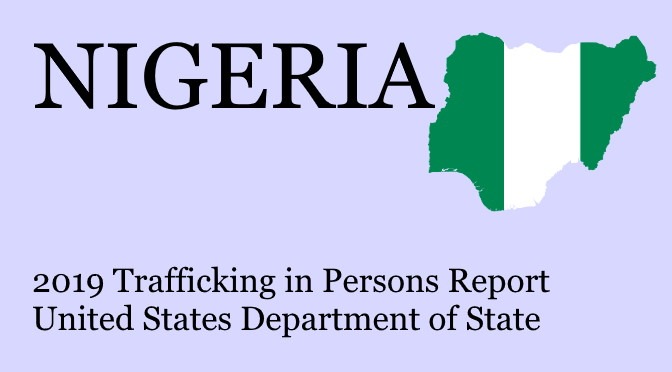
The government increased efforts to prevent human trafficking. NAPTIP continued to lead national government efforts to combat trafficking. In May 2018, the new Edo state antitrafficking law codified the ESTF, a working group led by the attorney general of Edo state, to lead state-level government efforts in Edo state. The inter-ministerial committee on trafficking met on an ad hoc basis and helped to develop national policies on trafficking, including the draft of a Protocol for Identification, Safe Return, and Rehabilitation of Trafficked Persons; at the end of the reporting period, the protocol was pending cabinet approval.
In March 2018, NAPTIP approved a 2019 anti-trafficking national action plan and continued drafting a five-year national action plan in collaboration with international donors and NGOs. NAPTIP continued awareness campaigns at schools, churches, and transit centers, among other places, and expanded media outreach via television and radio to educate the public on the identification and dangers of human trafficking. Once a week, each of NAPTIP’s nine zonal commands and the Abuja headquarters led such outreach campaigns to raise awareness of trafficking. In response to reports that some individual government employees, service providers, and security officials sexually exploited female IDPs, NAPTIP and an international organization continued conducting a screening and sensitization campaign in IDP camps in and around Maiduguri, including all state-run camps. NAPTIP also conducted outreach activities in IDP camps in Benue State for persons displaced by mass flooding and rural violence, and in IDP camps in the Federal Capital Territory.
The ESTF also conducted public awareness campaigns in Edo state, as did the Lagos state government, focused on the vulnerability of migrants to trafficking and sexual exploitation. NAPTIP and the ESTF increased collaboration during the reporting period to overcome initial conflicts over mandates. At the close of the reporting period, NAPTIP encouraged other states, such as neighboring Delta and Ondo states, to follow Edo state’s model; in March 2019, Delta and Ondo states inaugurated anti-trafficking task forces.
In the previous reporting period, NAPTIP began discussions on how to provide pre-departure information to migrants on available assistance if exploited abroad; NAPTIP did not report on the status of these plans. The government made some efforts to reduce the demand for commercial sex but did not make discernible efforts to reduce the demand for forced labor.
The Borno State government continued to provide financial and in-kind resources to the CJTF, a non-governmental self-defense militia, which used and recruited children in previous reporting periods. The Borno State government provided administrative support to help implement a 2017 action plan between CJTF and an international organization to end CJTF’s recruitment and use of children; the international organization did not verify any cases of recruitment and use of child soldiers by CJTF during the reporting period. However, humanitarian organizations were unable to access some areas of Borno state due to insecurity and restrictions imposed by security forces; the international organization had limited visibility in those areas.
The Nigerian government publicly criticized and imposed restrictions on those who portrayed the government in a negative light on human rights, including human trafficking. The government provided anti-trafficking training for its diplomatic personnel and, with foreign donor support, to Nigerian troops prior to their deployment abroad on international peacekeeping missions. During the previous reporting period, a foreign government reported to NAPTIP a Nigerian diplomat suspected of attempted smuggling, trafficking, or both; the government did not report investigating these allegations. In partnership with a foreign donor the government provided anti-trafficking training to its troops prior to their deployment as peacekeepers.
Adapted from TIP 2019 by the U.S. Department of State

